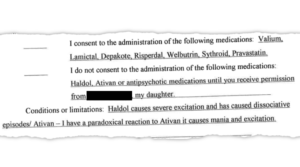From The New York Times: “Increasingly, patients, advocates and doctors believe [psychiatric advance] directives (called PADs) could help transform the mental health system by allowing patients to shape their care even when they lose touch with reality. Hospitals must put them in patients’ medical records and doctors are expected to follow them unless they document that specific preferences aren’t in the patients’ best medical interest.
As the pendulum has swung from institutionalization to outpatient care, psychiatric directives also offer a middle path by allowing patients to designate family members to speak for them when they’re too sick to do so themselves. […]
‘PADs could be a very important tool to minimize hospitalization and minimize involuntary commitment,’ said Cherene Allen-Caraco, chief executive officer of Promise Resource Network, a peer-counseling organization in Charlotte. By letting patients give permission beforehand to be committed to hospitals they prefer, the directives can avoid the arduous court-ordered commitment process — traumatic for patients, especially if they’re handcuffed by police.
‘And by listing what’s been hurtful to you in the past and what’s been helpful to you, that could be an advantage to the treatment provider,’ Ms. Allen-Caraco said.”












